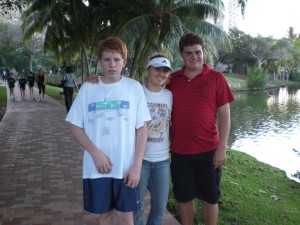Sunny south Florida is my hometown and where my passionate journey into the world of autism started in high school as a volunteer for a local YMCA special needs program. Fast forward eight years and a master’s degree later, it is time to come home and connect with those who helped form me into the person I am today.
I write this article for two reasons:
- To share some of the specific and broad barriers to housing in Florida, seeking feedback from those in other states.
- To tell a bit of how I came to be the creator of the Autism Housing Network with the hope that others will invest in future leaders of the field.
The University of Miami-Nova Southeastern Center for Autism and Related Disabilities (UM-NSU CARD) is one of the founding members of a national coalition called Advancing Futures for Adults with Autism, which Madison House Autism Foundation also joined in 2010. They serve thousands of individuals and families across south Florida, I know because my first job at UM NSU-CARD was a data entry position! It had been four years since I last saw Deborah Chin, now the Coordinator of Adult and Transition Services, and our meeting was as if we had not skipped a beat.
The following is some of the information Deborah shared about housing in south Florida and is eager to know if these trends are also present in other states:
- The National Residential Information Systems Project, a government-sponsored report, which is prepared by a University Center for Excellence in Developmental Disabilities (UCEDD) authorized under Public Law 106-402 (The Developmental Disabilities Assistance and Bill of Rights Act of 2000 or “DD Act”), has been tracking residential data since 1977. Its most recent findings in 2012 include an estimated total of 3,835 people with developmental disabilities (including autism) on a waitlist for residential services in Florida and that almost a 25% increase is needed to meet the current need. (Note: This does not include those who can try to find affordable housing vouchers and use their HCBS waivers for services.) Deborah confirmed this finding. She also believes that there are many more individuals with an autism spectrum diagnosis who are in need of housing and are not be eligible for the residential services or HCBS of which thousands are already wait-listed!
- Keeping in mind current the waitlist for needed housing, Deborah said that although many residential providers have empty beds, funding is unavailable. I decided to investigate exactly how much funding is being allotted to meet the increasing need for lifelong services and according to another government sponsored report produced by a UCEDD called the State of States in Developmental Disabilities came to find out since 2007 funding in Florida has decreased.
- Some autistic adults who desire to live independently could do so if transitional housing options were more readily available or if they could be paired with neurotypical roommates who could offer support and assistance when needed. Deborah mentioned she had tried to contact Mental Health services for those individuals who are also diagnosed with a mental health disorder to see if mental health service providers had availability in transitional housing opportunities. Apparently, if an individual has an autism diagnosis, he (or she) needs to be served by developmental disability service providers. Some individuals on the spectrum in south Florida are now living in nursing homes because no other options are available.
- Deborah also described the plight of boredom and frustration for autistic adults as lack of opportunity and support makes it difficult to secure jobs, find friendship, and navigate the world outside of their family unit.
The limited housing options and support services for autistic adults is not a new trend. Almost every state in the USA does not have the funding to provide for the current, not to mention, the future needs of autistic adults and others with developmental disabilities. Meeting K and M, both autistic adults working at UM-NSU CARD when I started, set a certain standard in my heart for what possibilities as the life as an autistic adult would be. It wasn’t until later that I realized their quality of life was not the norm… but I am still naive enough to think it could be!

As evidence on a high social return on investment, I come back to south Florida as a consultant, eager to offer knowledge and tools that I have developed for community organizing and creating homes and opportunities for autistic adults. If you only take away two things from this blog post let it be: invest in student leadership and advocate for more choices in residential options!
The faces of Canes PLUS participants, the program I started with a grant written by UM-NSU CARD, are no longer teeny boppers- they are now adults. I am excited to soon see them again! Together, and with help from our friends nationally through the Autism Housing Network, we will create better options for the future of autistic adults here in south FL!
PS I am facilitating a workshop on innovative housing ideas for the local AFAA group on Thursday, May 16, 2013 at the University of Miami. To register, click here.
UM-NSU Presentation with hyperlinks
[fblike layout=”standard” send=”true” action=”recommend” font=”arial” colorscheme=”light”]






